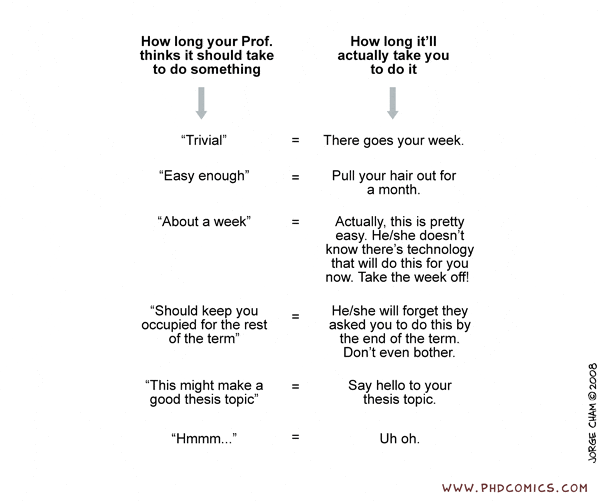Every research lab has its own culture, climate, and expectations. It seems that no two labs are identical. If you’re considering which research group to join, evaluating the lab culture may be just as important as the research when making your decision! Remember that, over the course of an average Ph.D., you’ll be spending the greater part of 4-6+ years with the people in your lab. The culture of the lab you join will have an impact on the quality of your sleep, social life, productivity (both inside and outside the lab!), sanity, overall well-being, and on the first few stages of your professional career. If you’re a more senior grad student, you’ve likely developed some strong opinions about how the culture in your lab affect these areas (for better or for worse).
Here are some points worth considering, whether you’re trying to assess a lab you’re considering joining, or your deep within a research project within a specific group:
- Each PI has his/her own culture, attitudes, background, and experiences too; and these often have significant influence on what its like to work in a given lab/group. The nature of the PI may not totally dictate the atmosphere throughout the rest of the lab group, though it will certainly have a large impact.
- Some PIs may tend to focus on or only talk to those students who they think are doing good work. While this may not be a problem if you’re working hard and making progress, such an attitude can impede your progress if you’re new to the research or are struggling with a genuinely tough topic or project.
- The tenure status of your PI can have an impact on his/her attitude toward lab members. Some students observe that, if their PI is working toward tenure but don’t have it yet, the PI may be less tolerating of mistakes, your time on the learning curve, etc. (New faculty are usually evaluated for tenure around their 5th year. If they aren’t promoted to tenure, they will be dismissed from the university; hence there is a somewhat understandable intense pressure on new faculty with young research labs.) Sometimes the before vs. after tenure status of the PI can manifest different styles of approaching you when you have a problem with your research: e.g. “What did you do wrong??” vs. “What do you think went wrong?”
- Bonus: A PI who has children may be better able to relate with their students, more understanding of people (e.g. you) who need time to learn a new skill, etc.
- Sometimes this attitude has nothing to do with tenure. Some people are simply nicer and more understanding than others. Choose your PI wisely.
- At some point, you will have a disagreement with your PI. At some point, your PI will be disappointed with something that you’ve done/haven’t done, or know/don’t know/should know. Remember that it is not a problem, per se, to have some issues now and then. That’s just normal. In such instances, you might try out the following ideas:
- Consider if they’re right: could it really be that you do need to brush up on a skill/topic?
- Is it possible that a difference in culture plays a part? This can be especially relevant if you and your PI grew up in different cultures. Try to put yourself in your PI’s shoes, and do some reflection to see if it could be A) a strange way to try to motivate you, B) something you feel is negative but they don’t consider that way, C) actual disappointment, etc.
- Having some problems now and then is to be expected. But there is no good excuse for persistent bad behavior. If you’re having nonstop conflicts with your PI, it may be best to consider switching to a different lab. (This happens all the time.)
- It’s important to understand the culture of your lab and PI in order to understand how to effectively and efficiently communicate within your group. For example, many PIs may act skeptical or less-than-you-hoped supportive of some new idea/initiative/software, but may be able to be convinced of its worth via some results. In such a case, you might find it most profitable for everyone involved to obtain some intermediate expertise and results before attempting to describe your idea.
